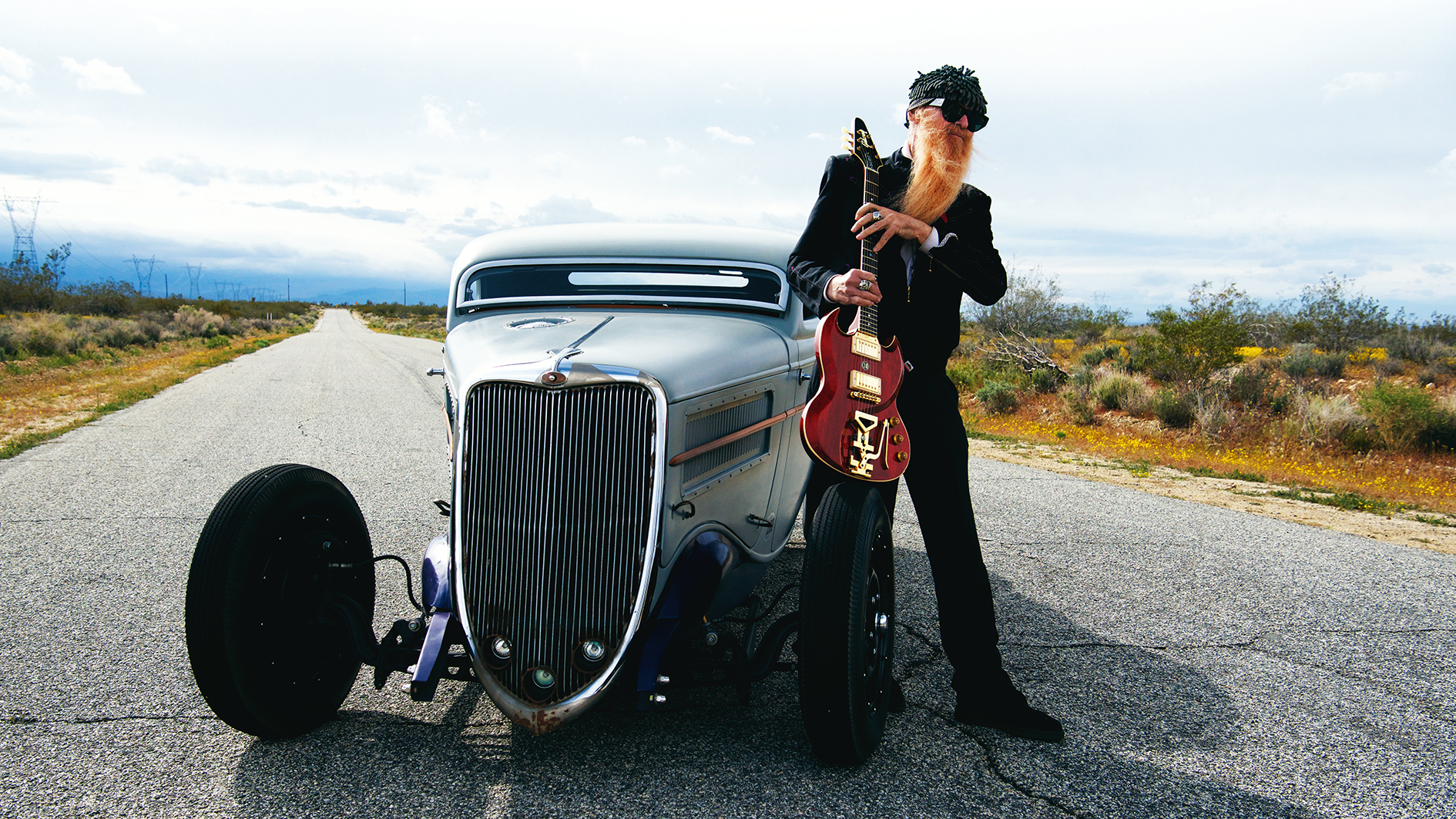Billy Gibbons: “I was fearless when I started playing, but learning that agonizing F chord was miserable!”
With new solo album Hardware in record stores, the ZZ Top icon sits down with TG to share some hard-earned wisdom

Growing up in Houston, Texas in the 50s and into the 60s, the young Billy Gibbons fell in love with the music of arch bluesmen such as Jimmy Reed, B.B. King, Freddie King and Lightnin’ Hopkins.
He woodshedded hard with his 1962 Gibson Melody Maker, cut his teeth with psych-rockers The Moving Sidewalks, and in ’69 joined up with now-deceased bassist Dusty Hill and drummer Frank Beard to form ZZ Top.
This trio’s stock in trade was smarter-than-it-sounds boogie rock and Hendrix-approved guitar smarts, all delivered with a tantalizing sense of mystique. They spent the '70s touring heavily, making quietly great albums such as Tres Hombres and Tejas, and writing tunes like all-time classic La Grange. But That Little Ol’ Band From Texas shrewdly knew how to move with the times, and broke into the mainstream big-style when MTV leapt on their 1983 album Eliminator.
New-fangled synths and sequencers hot-rodded their down-home blues rock on hits like Gimme All Your Lovin’, Sharp Dressed Man and Legs. Gibbons and Hill had their signature beards in place, Frank Beard ironically didn’t, and they were away.
Back in June 2020, drummer Matt Sorum (Guns N’ Roses/Velvet Revolver/The Cult) suggested to Gibbons that they forget the world, head out to the desert and ‘make some loud noise’. With a small team including Nashville producer Mike Fiorentino, they decamped to Escape Studio, set some 20 miles deep in the California desert near Joshua Tree, and wrote and recorded Hardware.
Gibbons’ third solo album is a modern-retro set packed with his trademark Texas tones and tunes drawing on slide-laden blues rock, 60s surf music and the kind of gravel-throated cinematics only The Reverend can provide.
TG caught up with this most cosmic of guitar heroes to get a taste of the album, to look back on 50 years of the Top, and to pick up some six-string tips, advice and philosophical guidance on the way. Strap in!
All the latest guitar news, interviews, lessons, reviews, deals and more, direct to your inbox!
Make the most of the gear around you...
“This go round, one of my favorite tracks is West Coast Junkie. The sound has got a lot of my guitar buddies saying, ‘Oh my god, don’t tell me you’re going back to surf days?!’ And I say, ‘Well, yeah!’
"I found a Fender Reverb in the corner of the studio, and despite the engineer waving me away we plugged it up and it worked. Parked next to a 1955 Gretsch Duo Jet was an early-60s Fender Jazzmaster, and I thought, ‘Wait a minute – a Jazzmaster and a Fender Reverb? We’re on!’
“It was 1962 all over again. Within a couple of weeks, we sent for our personal gear and some of our own favorites showed up. Pearly [Gates, Gibbons’ trademark Les Paul] has managed to be front and centre on just about every recording project of mine.“
Say ¡Hola! to a better sound – use a peso for a pick...
“That was one great thing in the desert – the Mexican peso was always in the pocket, and that was one countable element that wasn’t going to let us down. I got some pals who prefer using a very pliable plectrum, but I’ve gotten used to the fierceness of the peso. There’s zero flexibility – you can really dig in with the attack knowing it’s not going to let you down. You’re on it, you’re right there.“
On the subtleties of slide...
“I like glass and ceramic slides, but in a pinch – and the moms may not be too happy about this – you can go into the kitchen and saw off the leg of a kitchen stool, and you’ve got a nice metal slide. For Hardware, I actually started revisiting the mysteries of the lap steel.
“On the song Stackin’ Bones, we have two young ladies by the name of Larkin Poe, and I became intrigued by the way [Megan Lovell] was getting around on the Rickenbacker lap steel, the sound she got off it, so I started fooling around. I’ve got an old Rickenbacker ‘Frying Pan’ lap steel from the 1930s [the Electro A-22]. To get the best out of it we went to a solid steel guitar bar, and again that’s another element of sound that’s quite different.
“I have two of these Frying Pans, one an extended scale length, the other shorter, and I came to realize the shorter neck produced a darker tone. It’s much like Fender and Gibson – the Fender is a quarter-inch longer in scale length, and that makes Fenders a bit brighter. Matt and Mike liked the fat sound of the shorter one – the little one’s bigger!“
Practice, practice, practice. With vinyl, if you can...
“With the lure of leaving school, some people might find themselves in a world of swirl not knowing what to do. But I was pointed – I was going straight back to the house, going into my bedroom, picking up the six-string, firing up the record player and learning what was already in the grooves. I was fearless on that end, but learning to play that agonizing F chord was miserable!
“In fact I would encourage anybody just starting out to be sure to take time to, as the old adage goes, ‘practice, practice, practice, and then practice some more’. And now, with the unexpected return of the popularity of vinyl, be sure you got a record player handy. Lifting the needle off, you’re taking your hands off the strings momentarily to find that sweet spot on the record that you’re trying to learn. It’s all worth it.“
Your next step forward, that ‘field of greater charm’, is just a record away...
“There were different periods in ZZ Top’s career where we found that the field of greater charm seemed to be just over the horizon. But these are only as far away as the next record that you can learn to play along with, and for me that included attempting to learn all the chops by Eric Clapton, Jeff Beck, Mick Taylor, Peter Green, Mick Abrahams, Jimmy Page – the list goes on and on. Whatever suits your fancy, make sure you stay close by. I suppose you could download it, but just as long as you’re near it.“
Play live a lot, and try to surprise yourself...
“We toured for seven years running uninterrupted, from the time we started in late ’69 all the way until ’76. A lot of folks might’ve taken that as an excursion into abject boredom, but it was the quite the opposite.
“The set was two hours, and there was a slot between the first and second hour for two songs – each night the ‘unexpected song title call’ went from Dusty to Frank and back to me, and we never knew what was going to be thrown on the deck. So it kept it lively – here we are playing things we didn’t know how to play, but all of a sudden you’re in it, so the chops were getting honed night by night.“
But don’t work harder than you have to...
“For years I was playing flat-wound strings that were quite heavy, I thought that was where that big blues sound emanated from. Then once I was sharing a dressing room with B.B. King and he said, ‘Hey Billy, can I play your guitar?’ He gave it a few strums, handed it back and said, ‘Man, why are you working so hard? You need to lighten the load – you need some light-gauge strings’, And that’s what turned the corner, man...”
Move with the times, but don’t be afraid to give it some ‘Texas Mud’...
“It seems like we’ve always got one foot in the blues, but back in the early 80s, I became a fan and follower of Depeche Mode, who came blasting into the scene as a synth-pop band. They turned it upside down with Personal Jesus, I Feel You. I went to see them early on, I was looking at their stage – no drummer, no guitar player, no bass player, just three keyboards and a microphone, and that was it.
“But the sheer bombastic effect blew my mind, and that fateful encounter drew a friendship. This bearded guy from Texas with a bunch of synth-pop guys from the UK? Who’d’ve thought it’d result in friendship! Years later, Martin [Gore] and Dave [Gahan] called and said ‘Man, we’ve got a track here and we need some ‘Texas Mud’!’ That song was Soothe My Soul.“
Be adaptable when it comes to musical technology...
“You become quite familiar with the recording studio, as antiseptic as it may seem, and that used to be years of familiarity. But things are unfolding at such a rapid pace today, now at the end of the next week you’ve got something new you’ve got to wrap your head around.
"[At the time of Eliminator] the musical instrument manufacturers had reached a point where they were attempting to make discoveries or to be inventive: ‘How do we make something that is musically viable and appealing, but different enough to stimulate the market?’.
“All of a sudden these very strange things started appearing. We had the good fortune to be recording at Ardent Studios in Memphis, and the owner was not shy about reaching in deep pockets and investing in the next crazy piece of equipment. We discarded the manual immediately and started twisting knobs until we found something that we liked.
“Some of these new elements [synths, sequencers] just reinforce the rhythm section. It doesn’t really require jumping through hoops for new guitar technique. Frank Beard (the man with no beard) and Dusty and I – the purity of ZZ Top is that it’s just three guys and three chords.“

Mystique is a thing of the past in the social media age, and that’s okay...
“Mystique is like a blank piece of paper, in fact it could be a black piece of paper – it has flipped upside down and become much the opposite. Who wants to wait around any more for the big hero to dash from the black limousine to the stage door? You get nothing.
“The intrigue of personal interaction has reached a new depth now – we’re living in a time where it is possible to reach in and enjoy the depth of the exchange between strangers. Don’t get me wrong – it can be time-consuming and there’s only so many hours in the day, but the whole planet has become one. [Billy brandishes his iPhone] The new body part, right here – haha!“
- Hardware is out now via Concord.
Grant Moon is the News Editor for Prog magazine and has been a contributor to the magazine since its launch in 2009. A music journalist for over 20 years, Grant writes regularly for titles including Classic Rock and Total Guitar, and his CV also includes stints as a radio producer/presenter and podcast host. His first book, Big Big Train - Between The Lines, is out now through Kingmaker Publishing.

![B.B. King [left] cups his hands to his ear as he asks the crowd for more. Joe Bonamassa, with a Les Paul, gives his crowd a thumbs up](https://cdn.mos.cms.futurecdn.net/P3XrQLh86C27JfPp4AGp6n.jpg)